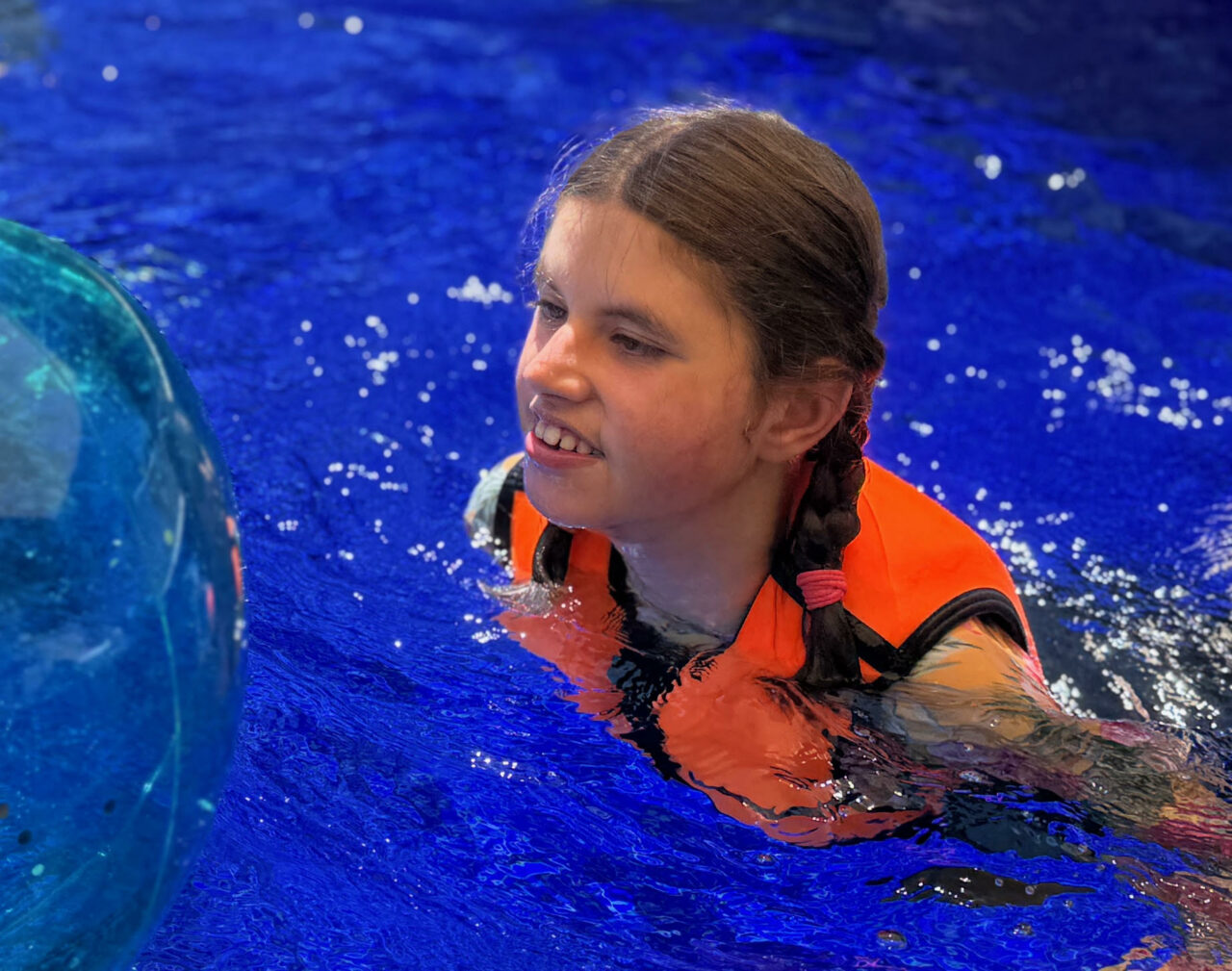
When Abbey was born, everything seemed to go smoothly.
“Well, no labour is truly uneventful, but there was nothing that stood out,” said her mum Sarah.
Things shifted when Abbey was about three months old and she began showing signs of developmental delays. She was slow to reach milestones, and her parents grew increasingly concerned. Then, at just two years old, and with Sarah 39 and a half weeks pregnant with her second child, Abbey had her first seizure in the middle of a Bunnings.
“That moment changed everything,” says Sarah. “It became our biggest, most constant source of stress: trying to understand what was happening and how to help Abbey.”
As a result of her condition, Abbey is unable to speak. Her medical team suspected a rare genetic disorder. Over the years, she underwent nearly every genomic test available. Her family enrolled in research studies, submitted samples, and waited.
But the years passed without answers as every test came back inconclusive. Without a diagnosis, Abbey had limited access to targeted treatments, tailored support, or opportunities to join clinical trials that might help.
The long road to a diagnosis
By the time Abbey was a teenager, her family had all but given up hope of finding a name for her condition.
“We knew a diagnosis wouldn’t change who Abbey is,” Sarah says. “But it could give us direction. It could open doors to therapies, to services, to research. It could connect us with other families like ours.”
Despite remarkable advances in genomic medicine, many families still face years-long diagnostic odysseys. More than half of people suspected to have a rare genetic condition remain undiagnosed, even after extensive testing.
That’s why the Centre for Population Genomics (CPG) has been building a comprehensive software platform to enable detailed analysis of genomic data from thousands of families like Abbey’s. The platform includes tools that can re-analyse genomic data at scale and detect previously missed patterns, especially as new discoveries emerge globally.
A breakthrough discovery
In 2024, Associate Professor Nicky Whiffin at the University of Oxford made a discovery that would change everything for Abbey’s family. She identified disease-causing changes in a small gene called RNU4-2, which had not previously been linked to any human disease.
Suspecting that other families around the world may also carry the same change, she reached out to Professor Daniel MacArthur and the team at CPG.
Using its powerful genomic analysis systems, CPG scanned its dataset of undiagnosed rare disease cases. Within twenty minutes, it had found six matching families. Two more followed within the hour.
One of those families was Abbey’s. For Sarah and her family, the moment was surreal.
“My husband and I were elated to receive a diagnosis,” she says. “After waiting for so long, I didn’t think it would happen. It didn’t feel real.”
For Dr. Whiffin, the impact of the finding was immediate. "It was very, very clear, very quickly that we found something that was really important," she told ABC. “It's the reason I do my job, to try and make a difference to families like these and to make such an impact overnight was pretty incredible."
The discovery, including the findings of the eight Australian families identified by CPG, was published in the prestigious journal Nature, leading to global attention.
A name and a community
After 15 years of unanswered questions, Abbey was finally diagnosed with ReNU syndrome, a newly recognised neurodevelopmental disorder linked to changes in RNU4-2.
Abbey’s clinical team put them in touch with a global Facebook group for families affected by ReNU syndrome.
“Just looking at the first few photos in the group, it was like meeting our family around the world,” says Sarah. “These were kids who looked like Abbey. Families who understood. It meant everything.”
When they joined, the group had just ten members. One year later, it had grown to more than 400.
The impact of one diagnosis
What was once a medical mystery is now recognised as one of the most common causes of previously undiagnosed neurodevelopmental disability.
Globally, thanks to this discovery, more than 1,000 families around the world have now received a ReNU syndrome diagnosis. Researchers estimate that more than 100,000 individuals may still be undiagnosed.
Abbey is now sixteen. “She doesn’t speak in words, but she has a lot to say,” says Sarah. “She’s very, very expressive. It doesn’t take very long to know what Abbey’s about and what she would like–usually potato chips. They’re her number one love in her life.”
Sarah knows their journey isn’t over. But for the first time, they’re not alone.
“Abbey has given me so much strength and resilience, she’s amazing,” Sarah says. “We’re so grateful for the scientists, the clinicians, and everyone who kept working behind the scenes. This story is bigger than just us.”
What comes next: innovation, equity, and hope
For families like Abbey’s, a diagnosis is not the end of the story. It’s a beginning.
It brings clarity and opens doors to specialised care and support. It connects people who have felt isolated for years. And it accelerates research to improve diagnosis and treatment that can benefit not just one family, but thousands more. Already, clinical labs around the world have changed their processes to ensure that their genomic tests can detect changes in the RNU4-2 gene, and at least two pharmaceutical companies are working to develop potential therapies.
At CPG, we believe every family living with a rare genetic condition deserves a diagnosis. Our mission is to make that possible by building the tools, partnerships, and systems needed to deliver answers faster, more accurately, and more equitably than ever before. We’re collaborating across borders and disciplines, working closely with clinicians, researchers, and families to ensure no one is left behind.